In today’s fiercely competitive business landscape, customer service is a cornerstone for how small businesses can stand out.
Studies indicate that around 86% of service teams emphasize the productivity-enhancing impact of a robust help desk system in helping them achieve exceptional service.
This buyer’s guide will help small business owners choose the best help desk software to elevate their customer service and stand out from the competition.
In this guide, we’ll cover:
What is help desk software for small businesses?
The top 8 small business help desk software solutions in 2024
Why small businesses need help desk software
See why Front is #1
What is help desk software for small businesses?
Help desks are centralized platforms that streamline customer support interactions efficiently. Help desk software for small businesses helps smaller companies manage customer support interactions efficiently, prioritizing simplicity and ease of use and catering to lower ticket volumes typically experienced by smaller enterprises. These solutions offer essential functionalities like ticket tracking, communication tools, and basic reporting tailored to meet specific needs of small businesses.
When considering which help desk solutions to use, small businesses should think about potential drawbacks of traditional systems. Traditional help desk systems might not be a fit for all small companies due to their complexity, and many are tailored more toward needs of larger enterprises. Smaller teams may find these systems overwhelming and difficult to navigate, leading to inefficiencies in managing support requests. Traditional help desk tools may also lack flexibility to adapt to the evolving needs of small businesses or integrate seamlessly with existing workflows.
Implementing and maintaining a traditional help desk system typically requires significant time, effort, and expertise, which small businesses may lack. A platform that a team can get up and running fast and that is easy to maintain by fewer team members will be a better investment.
It’s important that small businesses use a help desk software solution that helps navigate all of their relationships, including the complex ones — helping them connect one-on-one with customers and build strong, lasting relationships.
The top 8 small business help desk software solutions in 2024
Software | Starting price | Top features in starting plan |
Front | $19/seat/month |
|
Zendesk | $19/seat/month |
|
Freshdesk | $0 (up to 10 agents); >10 $15/agent/month |
|
Hiver | $15/user/month |
|
Help Scout | $20/user/month |
|
Salesforce Service Cloud | $25/user/month |
|
HubSpot Service Hub | $15/seat/month |
|
HappyFox | $39/agent/month |
|
Front
Front works with over 8,500 businesses of all shapes and sizes to deliver game-changing service and high customer satisfaction (CSAT) scores that win and retain customers for life. It stands out as an exceptional help desk solution for small businesses, offering a robust set of features they can tailor to their unique needs.
Front’s core features include:
Omnichannel shared inbox: By bringing together email, chat, SMS, WhatsApp, and more into one platform, teams can manage messages from a single familiar interface, boosting efficiency and reducing any switching between multiple tools. This centralization streamlines communication management for small businesses, leading to faster response time and boosted productivity. With Front, you get the best of both worlds: the efficiency of a help desk with the familiarity of email.
Real-time team collaboration: Small business teams need to stay agile and efficient. Front’s collaboration features, like internal comments, message assignments, and shared drafts enable teams to work together seamlessly on responding to messages. In a fast-paced business environment with teammates wearing lots of hats, real-time collaboration enables teams to make quick decisions and resolve issues with ease.
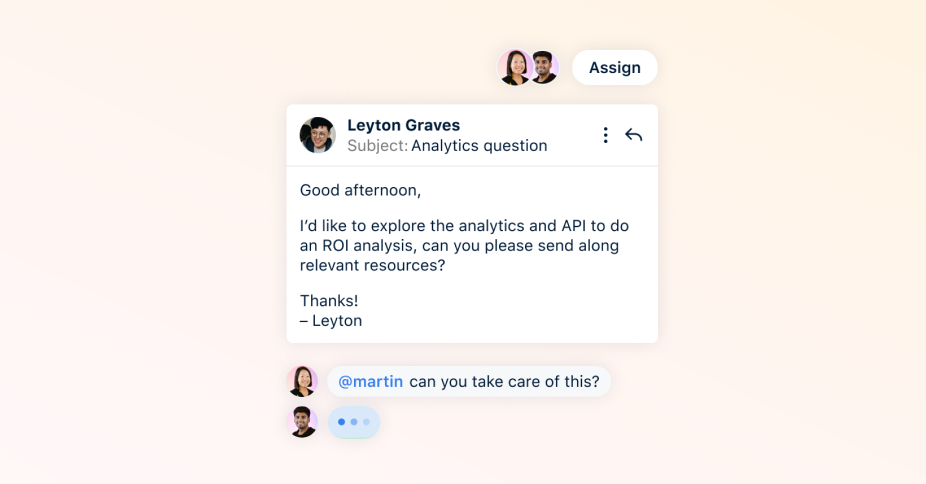
No-code workflow automation: Small businesses need to move fast and make the most of their people and processes. Small teams can use Front’s rules engine to design and build automated workflows. Easily route and assign incoming messages, helping teams reduce email volume and resolve issues faster, at scale. Automating manual tasks means more time for teams to focus on strategic business initiatives.
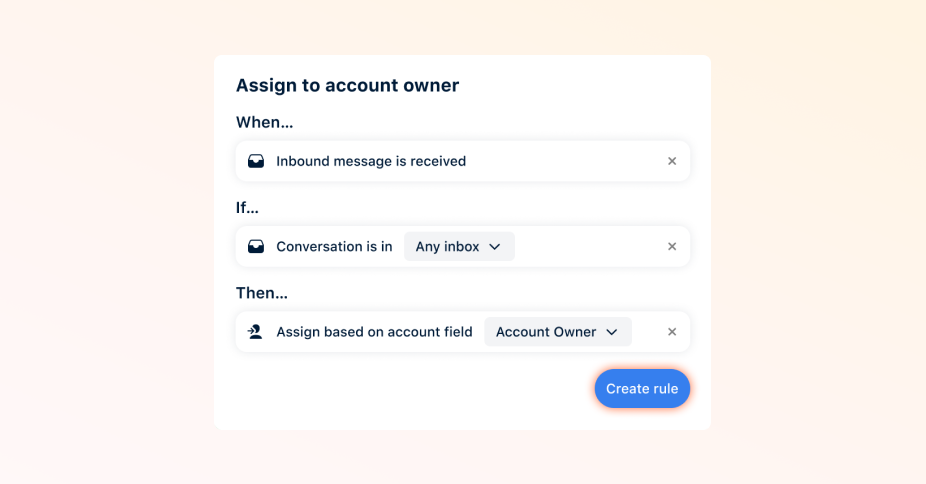
Productivity boost with artificial intelligence: Small companies need a boost to work faster and do more with less. Front’s AI capabilities help resolve customer inquiries instantly and power team efficiency. From instant chat resolution to email thread summarization and instant drafts with AI, AI can help your team do more for customers in record time.
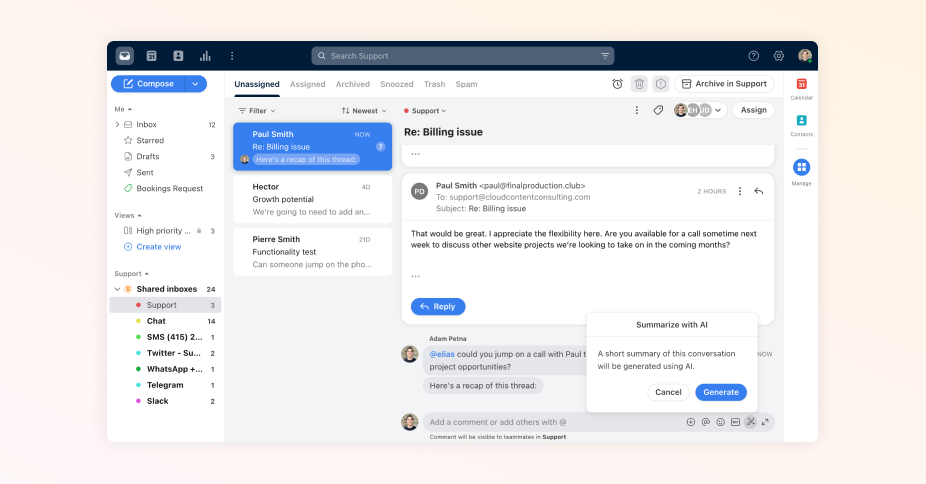
Analytics and insights: Small business teams need to stay vigilant in tracking key performance metrics like response times, message volume, and customer satisfaction (CSAT) scores to learn and scale. Front’s analytics and reporting features help users get visibility into team and individual performance, track key metrics, and identify areas for improvement.
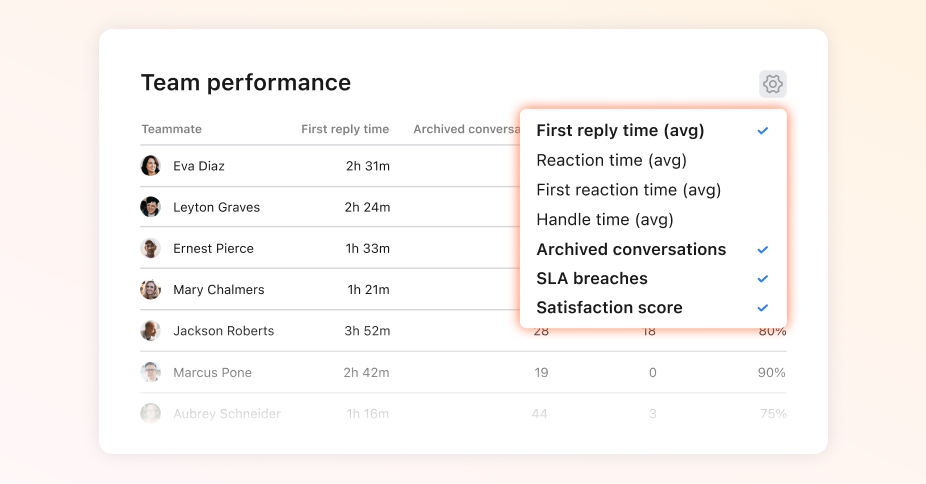
Integrations and API: Integrations allow small businesses to connect Front with all other essential tools and applications that keep them running, like CRM systems, project management platforms, and help desk software. Front enables you to bring all of your most-used tools and systems directly into the platform. Important customer context is just one sidebar click away to help pull important details or reference historical data.
Knowledge base: Reducing burden on customer support teams is critical, especially for smaller teams with fewer resources. Front enables teams to centralize knowledge in their help center for easy access to information and FAQs, empowering customers, teams, and partners to instantly find the information they need.
Award-winning customer support: Teams with fewer resources can often use a helping hand and extra guidance as they set up a new tool and scale its use across a business. Front is known for its excellent customer support team [that consistently achieves nearly 100% CSAT!], extensive knowledge base, Front community, and Front academy, providing users with assistance they need to maximize the value of Front.
With Front + Shopify, WizardPins delights customers
One notable customer success story in particular exemplifies how Front empowers small businesses to streamline support operations:
Front’s empowers WizardPins, a high-end custom pin and merchandise Shopify store, to deliver unparalleled customer service by streamlining email management and response times. Since switching from Gmail to Front, the WizardPins team can now efficiently handle customer requests, significantly reduce first response times and provide quick, comprehensive support. While competitors promise a response within 24 to 48 hours, WizardPins usually responds in 15 to 30 minutes or less because of Front. With Front’s integration with Shopify, they can access and update their Shopify data directly in their inboxes, gaining critical insights and streamline processes. Front enables the small business to scale while maintaining exceptional service.
Learn more about Front’s help desk solution.
Front G2 rating: 4.7 / 5
Starter: $19/seat/mo
Growth: $59/seat/mo
Scale: $99/seat/mo
Premier: $229/seat/mo
Zendesk
Zendesk is a popular help desk solution used by thousands of small businesses. It is based on a ticketing model and works best for more transactional interactions with customers. It also offers workflow tools that help automate repetitive tasks and streamline support processes.
The platform includes advanced features such as automation, SLA management, and reporting within the system, but additional integrations are needed for businesses requiring streamlined collaboration.
Zendesk may be better suited to more high-volume support environments where simple inquiries tend to be solved by agents individually without as much coordination with others.
Core features:
Ticketing system
Business rules
Customer details and interaction history
Zendesk G2 rating: 4.3 / 5
Pricing:
Support team: $19/agent/month
Suite team: $55/agent/month
Suite growth: $89/agent/month
Suite professional: $115/agent/month
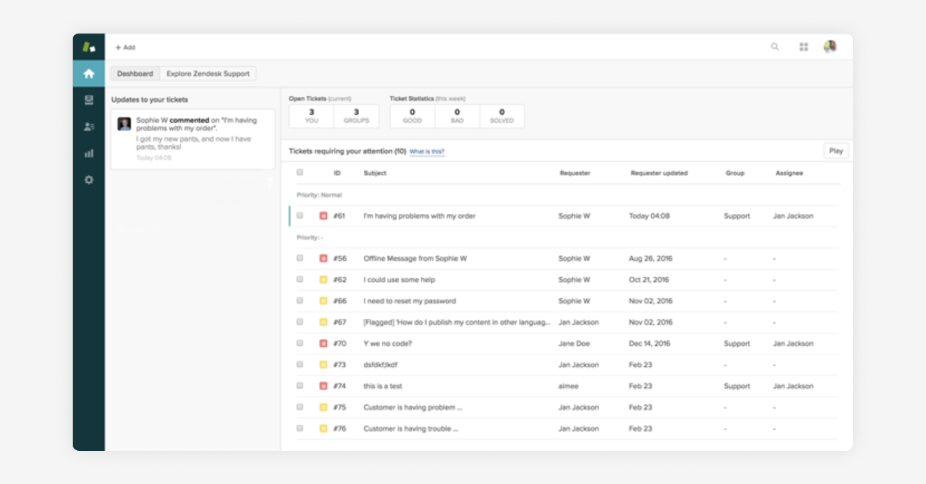
Freshdesk
Freshdesk is scalable and adaptable to many types of businesses. It offers flexible pricing plans and customizable features.
Freshdesk offers a robust ticketing system that allows teams to organize, prioritize, and track customer inquiries efficiently. Due to its lack of collaboration capabilities compared to other platforms, it may be better designed for transactional inquiries and industries with simpler service requirements.
Core features:
Custom ticket views
Email ticket routing
Knowledge base
Time tracking
Freshdesk G2 rating: 4.4 / 5
Pricing:
Growth: $15/agent/month
Pro: $49/agent/month
Enterprise: $79/agent/month
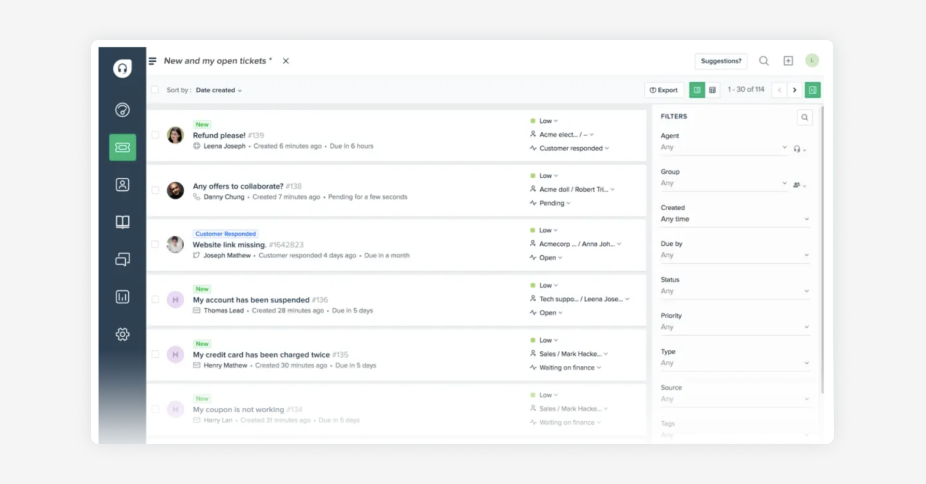
Hiver
Hiver is known for its simplicity and ease of use, making it a good choice for small businesses with limited resources after purchasing. It’s specifically designed to streamline email collaboration, fitting intuitively within Gmail’s interface and offering features like shared inboxes, email delegation, and email notes. This focus on email collaboration makes Hiver a good fit for small businesses that primarily rely on email for communication with customers and team members.
The platform also provides flexible pricing options. While it does offer integrations with some popular third-party tools, integration offerings are not as robust as other tools.
Core features:
Email management
Multi-channel capabilities
Live chat
Knowledge base
Hiver G2 rating: 4.6 / 5
Pricing:
Lite: $15/user/month (yearly)
Pro: $49/user/month (yearly)
Elite: $79/user/month (yearly)
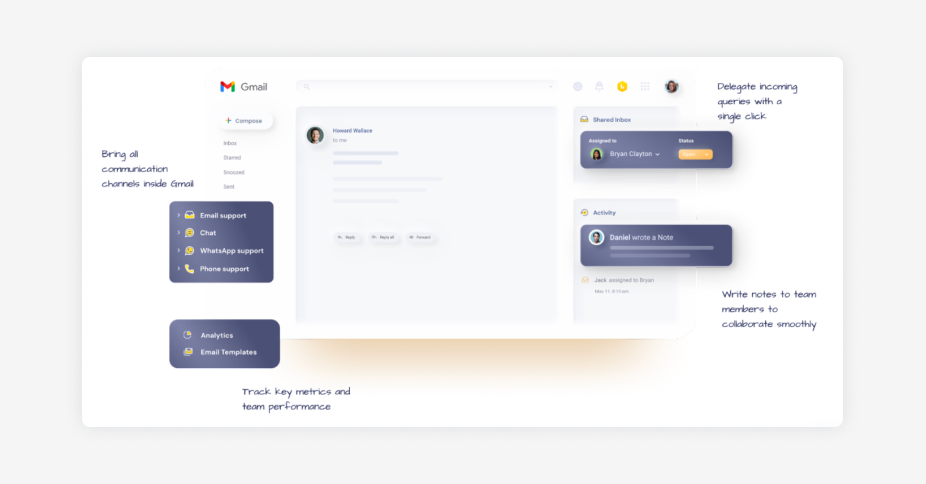
Help Scout
The Help Scout help desk platform is simple to get up and running, good for smaller teams requiring a straightforward, easy onboarding process.
Analytics features aren’t as powerful compared with other solutions — you can get a decent sense of real-time performance of your team, but dig beyond that and the platform falls short for those seeking robust analytics.
Core features:
Email management
Shared email inboxes, Voice, WhatsApp channels
Live Chat
Knowledge base
Help Scout G2 rating: 4.4 / 5
Pricing:
Standard: $20/user/month
Plus: $40/user/month
Pro: $65/user/month
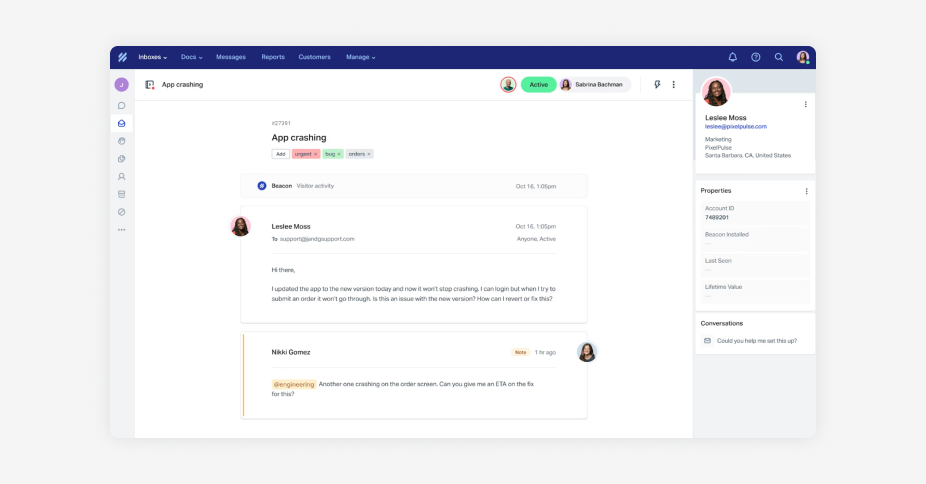
Salesforce Service Cloud
Salesforce Service Cloud operates off of a case management model. It can be an appealing option for teams already using tools from the broader Salesforce portfolio. The interface provides a comprehensive view of the customer by consolidating data from various sources, including CRM systems, service interactions, purchase history, and social media activity.
Its configuration is robust, but flexibility can be a double-edged sword — it’s complex, and it requires dedicated time and training to learn, implement, and maintain. The time and knowledge required for set up might not be a good fit for small companies looking to set up and start running the platform quickly.
Core features:
Case Management
Customizable reports & dashboards
Knowledge base
Salesforce Service Cloud G2 rating: 4.3 / 5
Pricing:
Starter suite: $25/user/month
Professional: $80/user/month
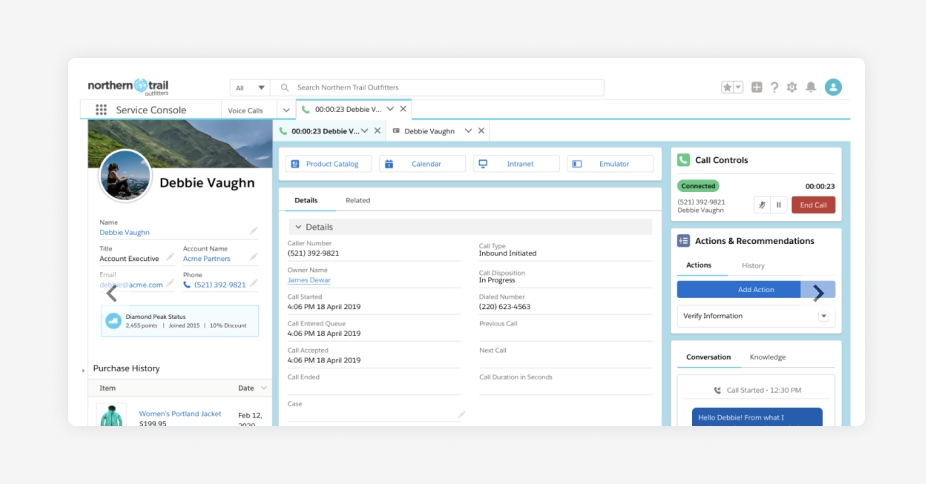
HubSpot Service Hub
HubSpot Service Hub is part of the larger HubSpot ecosystem, which includes marketing, sales, and customer service tools. Small businesses can benefit from having all their customer-related functions centralized in one platform, enabling smooth communication.
Service Hub offers a range of customer service tools, including ticketing, live chat, knowledge base, and customer feedback surveys. It’s a simple-to-use and functional platform, but it might lack the more robust channels and integrations provided by other solutions, which are important for smaller companies as they scale.
Core features:
Conversational tools
Shared inbox
Help desk automation
Knowledge base functionality
HubSpot Service Hub G2 rating: 4.4 / 5
Pricing:
Starter: $15/month/seat
Professional: $90/month/seat
Enterprise: $130/seat/month
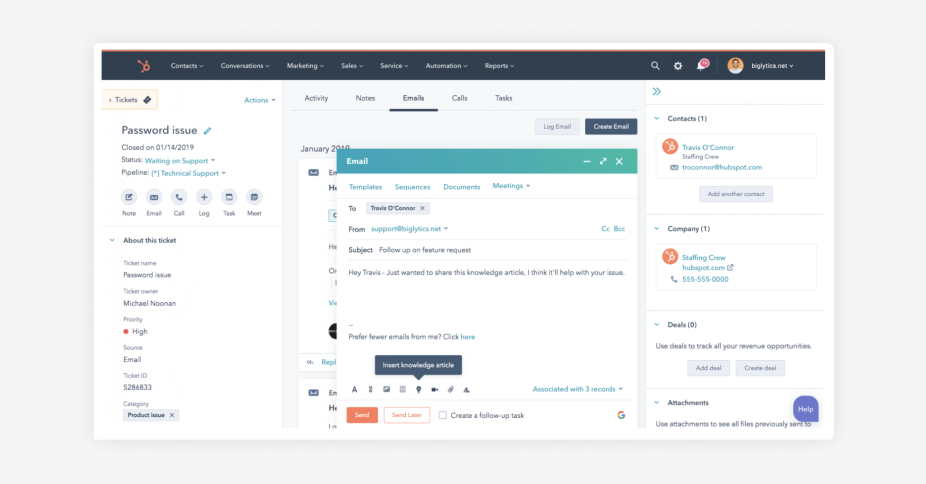
HappyFox
With HappyFox, small businesses can convert email, phone, live chat, chatbots, social media, and web requests into actionable tickets in an omnichannel support ticket system. It’s well-rounded and offers a user-friendly interface.
Its help desk analytics tool provides small companies with real-time reports and key support metrics that help them gauge service quality and make decisions to optimize the support process.
Core features:
Omnichannel ticket creation
SLA Management
Knowledge base
HappyFox G2 rating: 4.5 / 5
Pricing:
Mighty: $39/agent/month
Fantastic: $59/agent/month
Enterprise: $79/agent/month
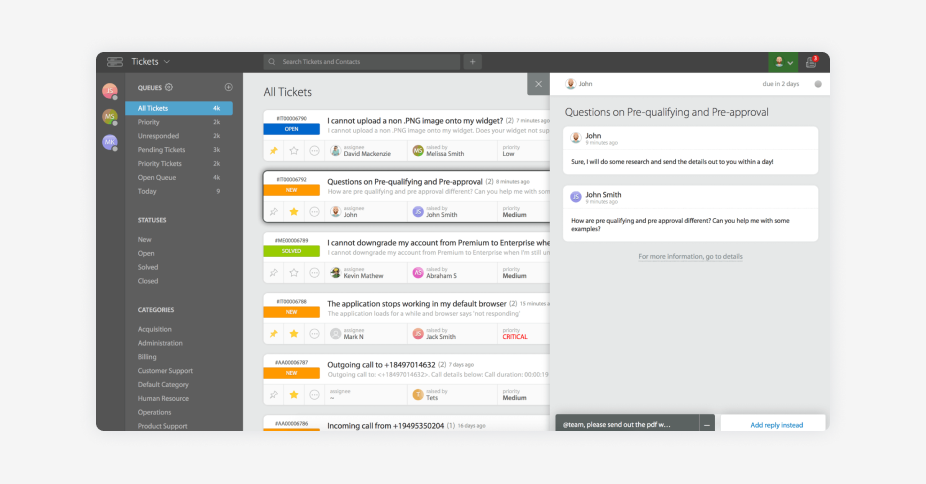
Why you need help desk software for small businesses
Small businesses are increasingly turning to help desk software to streamline their customer support operations. Importantly, the adoption of help desk solutions doesn’t mean sacrificing the personal touch that sets small businesses apart. Help desk software can enhance the personalization of customer interactions in several ways:
1. Better organization and collaboration
With the right help desk software, small businesses can organize customer inquiries more efficiently, ensuring no question goes unanswered.
2. Accessibility
Help desk software enhances accessibility for both businesses and customers — small businesses can respond to customer inquiries from anywhere, at any time, using web-based or mobile applications. Help desks offer self-service support options like knowledge base and chatbots, which help keep a high level of service possible and customers satisfied with flexible options to find solutions.
3. Data and reporting
Help desk software offers data and reporting capabilities that empower small businesses to gain insights into their customer interactions. By tracking key metrics such as response times, resolution rates, and CSAT scores, businesses can identify trends, measure performance, and make data-driven decisions to improve their processes.
See why Front is #1
Front stands out as an exceptional help desk solution for small businesses, offering a comprehensive suite of features tailored to their specific needs.
Front equips small businesses with all the tools they need to succeed in today’s competitive landscape: omnichannel shared inboxes, real-time team collaboration, no-code workflow automation, analytics and insights, AI capabilities, and more. Front’s renowned customer support team ensures users receive the necessary guidance to onboard fast and maximize the value of the platform.
With Front, small businesses can enhance their customer support efforts while maintaining their personal touch with customers, driving growth and success.
Experience the difference with Front’s help desk solution for small businesses – get started today.
Written by Sara Shaughnessy
Originally Published: 11 April 2024

